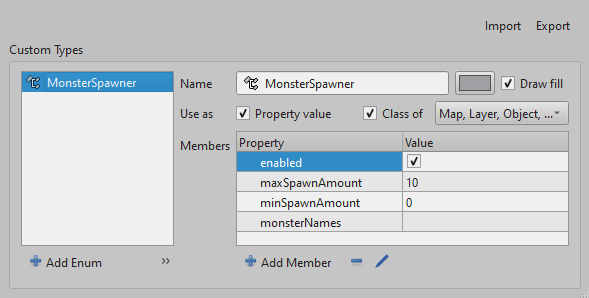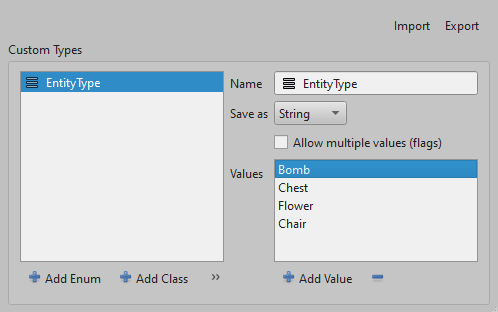8.1 KiB
Custom properties
Tiled facilitates a very flexible way to store custom data in your maps using properties. Accessing these properties is a common task when working with Tiled maps in your game since it will allow you to fully utilize the strengths of Tiled, such as customizing the behavior of your game objects or setting up the initial state of your game world.
All classes that can contain properties
All classes that can contain custom properties implement the interface xref:DotTiled.IHasProperties in some way. Below is an exhaustive list of all classes that can contain custom properties:
- xref:DotTiled.BaseLayer
- xref:DotTiled.ClassProperty (allows for recursive property objects)
- xref:DotTiled.CustomClassDefinition (used to define custom Tiled property types)
- xref:DotTiled.Object
- xref:DotTiled.Tileset
- xref:DotTiled.Tile
- xref:DotTiled.WangTile
- xref:DotTiled.WangColor
How to access properties
To access the properties on one of the classes listed above, you will make use of the xref:DotTiled.IHasProperties interface.
In situations where you know that a property must exist, and you simply want to retrieve it, you can use the xref:DotTiled.IHasProperties.GetProperty``1(System.String) method like so:
var map = LoadMap();
var propertyValue = map.GetProperty<BoolProperty>("boolPropertyInMap").Value;
If you are unsure whether a property exists, or you want to provide some kind of default behaviour if the property is not present, you can instead use the xref:DotTiled.IHasProperties.TryGetProperty``1(System.String,``0@) method like so:
var map = LoadMap();
if (map.TryGetProperty<BoolProperty>("boolPropertyInMap", out var property))
{
// Do something with existing property
var propertyValue = property.Value;
}
else
{
// Do something if property does not exist
}
For both methods, you can replace BoolProperty with any of the property types that Tiled supports. You can find a list of all property types and their corresponding classes in the next section.
All types of properties
Tiled supports a variety of property types, which are represented in the DotTiled library as classes that implement the xref:DotTiled.IProperty`1 interface. Below is a list of all property types that Tiled supports and their corresponding classes in DotTiled:
bool- xref:DotTiled.BoolPropertycolor- xref:DotTiled.ColorPropertyfloat- xref:DotTiled.FloatPropertyfile- xref:DotTiled.FilePropertyint- xref:DotTiled.IntPropertyobject- xref:DotTiled.ObjectPropertystring- xref:DotTiled.StringProperty
In addition to these primitive property types, Tiled also supports more complex property types. These custom property types are defined in Tiled according to the linked documentation, and to work with them in DotTiled, you must define their equivalences as a xref:DotTiled.ICustomTypeDefinition. You must then provide a resolving function to a defined type given a custom type name, as it is defined in Tiled.
Custom types
Tiled allows you to define custom property types that can be used in your maps. These custom property types can be of type class or enum. DotTiled supports custom property types by allowing you to define the equivalent in C# and then providing a custom type resolver function that will return the equivalent definition given a custom type name.
Class properties
Whenever DotTiled encounters a property that is of type class in a Tiled file, it will use the supplied custom type resolver function to retrieve the custom type definition. It will then use that definition to know the default values of the properties of that class, and then override those defaults with the values found in the Tiled file when populating a xref:DotTiled.ClassProperty instance. class properties allow you to create hierarchical structures of properties.
For example, if you have a class property in Tiled that looks like this:
The equivalent definition in DotTiled would look like the following:
var monsterSpawnerDefinition = new CustomClassDefinition
{
Name = "MonsterSpawner",
UseAs = CustomClassUseAs.All, // Not really validated by DotTiled
Members = [ // Make sure that the default values match the Tiled UI
new BoolProperty { Name = "enabled", Value = true },
new IntProperty { Name = "maxSpawnAmount", Value = 10 },
new IntProperty { Name = "minSpawnAmount", Value = 0 },
new StringProperty { Name = "monsterNames", Value = "" }
]
};
Enum properties
Tiled also allows you to define custom property types that work as enums. Similarly to class properties, you must define the equivalent in DotTiled as a xref:DotTiled.CustomEnumDefinition. You can then return the corresponding definition in the resolving function.
For example, if you have a custom property type in Tiled that looks like this:
The equivalent definition in DotTiled would look like the following:
var entityTypeDefinition = new CustomEnumDefinition
{
Name = "EntityType",
StorageType = CustomEnumStorageType.String,
ValueAsFlags = false,
Values = [
"Bomb",
"Chest",
"Flower",
"Chair"
]
};
[Future] Automatically map custom property class types to C# classes
In the future, DotTiled will support automatically mapping custom property class types to C# classes. This will allow you to define a C# class that matches the structure of the class property in Tiled, and DotTiled will automatically map the properties of the class property to the properties of the C# class. This will make working with class properties much easier and more intuitive.
The idea is to expand on the xref:DotTiled.IHasProperties interface with a method like GetMappedProperty<T>(string propertyName), where T is a class that matches the structure of the class property in Tiled.
This functionality would be accompanied by a way to automatically create a matching xref:DotTiled.ICustomTypeDefinition given a C# class or enum. Something like this would then be possible:
class MonsterSpawner
{
public bool Enabled { get; set; } = true;
public int MaxSpawnAmount { get; set; } = 10;
public int MinSpawnAmount { get; set; } = 0;
public string MonsterNames { get; set; } = "";
}
enum EntityType
{
Bomb,
Chest,
Flower,
Chair
}
var monsterSpawnerDefinition = CustomClassDefinition.FromClass<MonsterSpawner>();
var entityTypeDefinition = CustomEnumDefinition.FromEnum<EntityType>();
// ...
var map = LoadMap();
var monsterSpawner = map.GetMappedProperty<MonsterSpawner>("monsterSpawnerPropertyInMap");
var entityType = map.GetMappedProperty<EntityType>("entityTypePropertyInMap");
Finally, it might be possible to also make some kind of exporting functionality for xref:DotTiled.ICustomTypeDefinition. Given a collection of custom type definitions, DotTiled could generate a corresponding propertytypes.json file that you then can import into Tiled. This would make it so that you only have to define your custom property types once (in C#) and then import them into Tiled to use them in your maps.
Depending on implementation this might become something that can inhibit native AOT compilation due to potential reflection usage. Source generators could be used to mitigate this, but it is not yet clear how this will be implemented.

